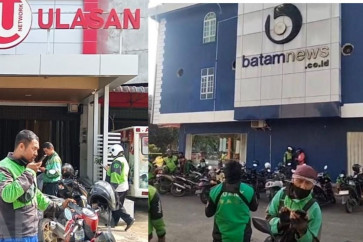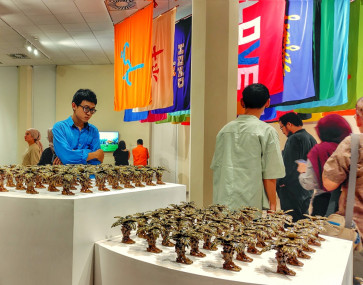Popular Reads
Top Results
Can't find what you're looking for?
View all search resultsPopular Reads
Top Results
Can't find what you're looking for?
View all search results‘Odong-odong’ drivers ask city to reconsider ban plan
Dangerous expedition: Children ride in an odong-odong (amusement ride) on a road in Depok, West Jakarta, in September
Change text size
Gift Premium Articles
to Anyone
D
angerous expedition: Children ride in an odong-odong (amusement ride) on a road in Depok, West Jakarta, in September.(JP/Ricky Yudhistira)
For many parents, odong-odong (amusement ride) are helpful whenever their children throw a tantrum or simply to get them to finish their food.
So when news broke about Jakarta’s plan to ban the ride out of safety concerns, it was not only the odong-odong drivers that opposed the idea but also parents who had relied on such amusement rides to pacify their children.
Nuriyanti, who lives in Kebon Jeruk, West Jakarta called on the Jakarta administration to find a better solution.
“Please don’t take odong-odong away from us [parents],” she said on Thursday.
Nuriyani said her 4-year-old son enjoyed odong-odong of any type, be it the ride that takes children around the neighborhood — which will be banned by Jakarta — and the mini-carousel ride.
“My son likes to ride odong-odong as I feed him; he eats faster because he is playing and being entertained as he chews. He always gets excited every time he hears children’s songs played by the odong-odong from afar,” Nuriyanti said.
The plan was announced by the Jakarta Transportation Agency earlier this week, citing safety reasons as the main factor for the ban.
On Wednesday afternoon inside a small car workshop in Ciracas, East Jakarta, the agency’s representatives and odong-odong drivers grouped under the Odong-odong Anglingdarma Community met and discussed solutions that could bridge the interests of the affected parties.
“[The ban] is mainly due to safety reasons. Odong-odong is a type of vehicle that does not comply with public transportation vehicle standards as stipulated by the law,” Wendi Purnama from the agency’s road transportation unit told The Jakarta Post after the meeting. He referred to Law No. 22/2009 on road traffic.
Odong-odong are modified minibuses that use private vehicle license plate numbers, hence they are not supposed to be used as mass transportation vehicles.
In late July 2018, 11 children were injured in a traffic accident between an odong-odong and a truck on Jl. Dr. Rajiman Widyodiningrat in Cakung, East Jakarta.
The truck hit the odong-odong from behind while dozens of children and their mothers were on board. The odong-odong rolled over and eventually fell into a waterway near the street.
However, when asked about the odong-odong’s safety, Nuriyani said she was not concerned about safety because the odong-odong only operated on small roads in residential areas, not on crowded main roads.
Meanwhile, Odong-odong Anglingdarma Community head Agus Soleh called on the Jakarta administration to reconsider the plan since many people relied on the odong-odong to support their families.
“We are ready to modify our odong-odong to meet standards,” he said, noting that he dreamed of making odong-odong as iconic as the capital’s bajaj (three-wheeled motorized vehicle).
“The city should realize that this has been part of many people’s lives. If there is one or two things that we have done wrong, then show us the right way. We didn’t mean to break any laws, so don’t ban our operations,” he added.
Agus showed the Post how odong-odong were made in his workshop.
The vehicle’s exterior is thick aluminum and the railing is made from iron. Instead of using regular glass, Agus uses tempered glass for the windshield. Each single odong-odong is equipped with a karaoke set, including a 24-inch flat screen.
An odong-odong has four rows of seating, which can carry around 15 people — children and adults.
All drivers apply the same rate. For every ride, one child is charged Rp 3,000 (19 US cents) while adults are charged Rp 5,000. One ride is equal to circling a kampung once. Passengers are picked up and dropped off at the same point.
“The agency has offered us jobs as JakLingko drivers. But that’s not what we want. We want odong-odong to remain in operation,” Agus said.
Odong-odong Anglingdarma Community member Haryono said he had been an odong-odong driver since 2012. Back then, he gave up a lot of things so that he could purchase an old minibus and modify it into an odong-odong at Agus’ workshop.
“I sold my precious assets. I borrowed money from my kids. I needed Rp 60 million for the modifications,” the 65-year-old reminisced.
“I earn roughly Rp 100,000 to Rp 150,000 per day since I only operate from 3 p.m. until dusk. It took me years to finally pay my debts. Now that I’m starting to enjoy my income, the city has come up with this ban. I don’t know how to react,” Haryono added.
Echoing Haryono, Imron said operating odong-odong was a job that suited him best. He usually combs areas in Condet, Kramat Jati district, East Jakarta.
Every day, he helps his wife with domestic chores in the morning before driving odong-odong from 9 a.m. until around 12 p.m. when he picks his children up from school. He hits the road again at 3 p.m. and goes home before dark.
“I’ve tried making a living by doing other jobs but to no avail due to health problems. I once was a salesperson and a factory worker, but I quit because I was sick; my body couldn’t keep up such activities,” he said.
He earns enough to support his family.
“On a good day, I can earn up to Rp 200,000. But since we’re using the engine of an old car, the more we operate, the more I need to spare for maintenance,” he said.
Despite being open for discussion and offering alternative solutions, the city plans to move forward with the ban.
Similar measures have been taken by the Central Jakarta Transportation Agency. The agency’s head, Harlem Simanjuntak, said his side would work with the police to apply the ban in the municipality.
“We will coordinate with the police to enforce the new rule,” he said as quoted by kompas.com.










